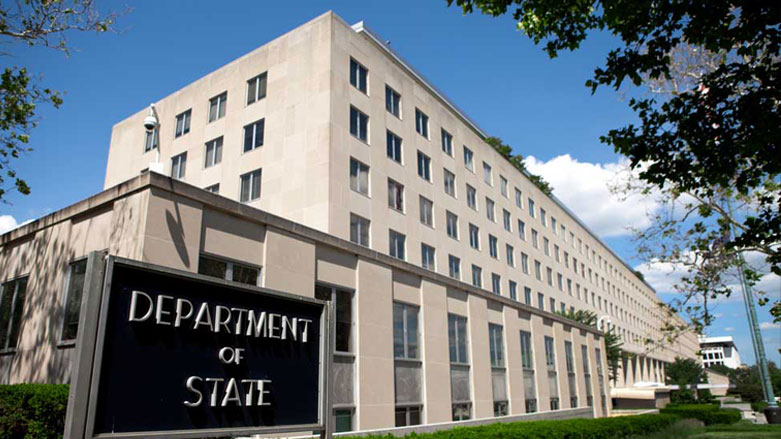US seeks to boost ‘enduring relationship’ with Kurdistan Region, as US resumes engagement in Iraq

WASHINGTON DC, United States (Kurdistan 24) – Speaking to journalists on Wednesday, the State Department’s Principal Deputy Spokesperson Vedant Patel affirmed Washington’s commitment to promoting close ties between the American people and the people of the Kurdistan Region.
Patel’s remarks came, as the Biden administration steps back from a preoccupation with reviving the Iranian nuclear accord and broadens its concerns about the region to promote a more stable situation in Iraq, as marked by the visit of Barbara Leaf, Assistant Secretary of State for Near Eastern Affairs, to Erbil and Baghdad.
Read More: Senior State Department official to visit Erbil
Leaf, Iraq, and Erbil
Leaf assumed her current position on May 31. Previously, she headed the Middle East and North Africa desk at the National Security Council in the Biden White House. From 2014 to 2018, she was the US ambassador to the United Arab Emirates (UAE.)
Leaf’s experience in Iraq goes back to the last years of the US-led war that ousted Saddam Hussein. From 2010 to 2011, she led the State Department’s Provincial Reconstruction Team in Basra, which, subsequently, became the consulate there.
Yet, in 2018, the US closed that consulate after it was repeatedly targeted by Iranian-backed militias. That has left the consulate in Erbil, as the only US diplomatic facility in Iraq, besides the embassy.
Asked about Leaf’s schedule in Erbil, Patel explained that she was having “a number of meetings with political leaders in Iraqi Kurdistan to strengthen the enduring relationship between the U.S. and the people of the IKR [Iraqi Kurdistan Region.]”
The Assistant Secretary “is emphasizing the urgency of resolving Iraq’s political impasse in an inclusive way,” Patel continued, “including the importance of unity among the Kurdish parties in forging a more secure, democratic, and prosperous future.”
Indeed, Leaf discussed that issue on Wednesday with Masoud Barzani, long-time president of the Kurdistan Region, before he stepped down in late 2017. But he remains head of the Kurdistan Democratic Party (KDP), which won the largest share of the Kurdish vote in last October’s elections.
Indeed, the KDP is aligned with the Sadrist party and Taqaddum, the Sunni Arab party, headed by the Speaker of the Iraqi Parliament, Mohammed al-Halbousi. Sadr, along with the KDP and Taqaddum, had a majority of seats in the Iraqi parliament.
Sadr should have been able to form a government, but as the negotiations were underway, Tehran engineered a judicial coup and suborned Iraq’s Supreme Federal Court (SFC).
The court then raised the threshold for the number of seats required for government formation, thwarting Sadr’s efforts. So for the past ten months, Iraq has been without a permanent government.
Sadr has proposed holding early elections, and as Barzani told Leaf, “We do not have any objection to holding an early election, as long as the process is inclusive and facilitated politically and legally.”
Barzani also stressed the importance of resolving disputes between Erbil and Baghdad on the basis of the Iraqi constitution—as established after the 2003 US-led overthrow of Saddam Hussein and his regime.
Read More: KDP has no objection to Iraq’s early election: President Barzani
The issues in dispute between Erbil and Baghdad include energy production in the Kurdistan Region. Iran has sought to restrict Kurdish energy production through the same “judicial coup” that thwarted Sadr and favored Iran’s political allies in Baghdad.
Another dubious ruling by Iraq’s SFC denied the Kurdistan Regional Government (KRG) the right to sell its own oil—although Iraq’s constitution allows for such sales.
Regarding the energy dispute between Erbil and Baghdad, Patel said that the US encourages “the parties to determine a way forward that supports existing and future investment and advances the interests of the Iraqi people, including those in the Kurdistan Region.”
Patel might have added that such a move advances the interests of the US and Europe, as well. Energy supplies have become a major weapon in the confrontation over Russia’s invasion of Ukraine.
Western efforts to deny Moscow funds for that war by limiting imports of Russian energy are driving up fuel prices around the world and, with that, global inflation.
But the KRG is ready to do what it can to help. Last March, speaking at the Global Energy Forum in Dubai, KRG Prime Minister Masrour Barzani expressed his government’s readiness to raise levels of energy production in the Kurdistan Region.
Read More: US welcomes increased energy production as KRG announces readiness to help meet world energy needs
Indeed, energy production in the Kurdistan Region was a major focus of Leaf’s activities on Wednesday.
The issue arose in two of her meetings. One was with Barzani. Leaf told the Kurdish Prime Minister that the US would intensify its efforts to resolve outstanding issues between Erbil and Baghdad, particularly in the oil and gas sector.
Read More: US doubling efforts to resolve Erbil-Baghdad energy issues, top US official tells PM Barzani
Earlier in the day, Leaf saw the KRG’s Deputy Prime Minister, Qubad Talabani, who explained that the dispute between Erbil and Baghdad was not about which party sold the oil, but about ensuring that the Kurdistan Region receives its “fair share” of revenues.
Read More: ‘Who sells the oil is not our issue’, DPM Talabani tells top US official
